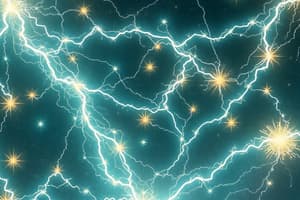Podcast
Questions and Answers
What is the electric potential difference between two points equivalent to?
What is the electric potential difference between two points equivalent to?
- The electric dipole moment of a system
- The work done in moving a unit charge from one point to the other (correct)
- The electric field strength at a given point
- The electric flux through a closed surface
What is the unit of electric dipole moment?
What is the unit of electric dipole moment?
- Volt (V)
- Newtons per meter (N/m)
- Joule per coulomb (J/C)
- Coulomb-meter (C·m) (correct)
What is the electric constant ε₀ proportional to in Gauss's Law?
What is the electric constant ε₀ proportional to in Gauss's Law?
- The electric flux through a closed surface
- The electric potential difference between two points
- The charge enclosed within the surface (correct)
- The electric field strength at a given point
What is the electric potential a measure of at a given point in an electric field?
What is the electric potential a measure of at a given point in an electric field?
What is the electric flux through a closed surface proportional to in Gauss's Law?
What is the electric flux through a closed surface proportional to in Gauss's Law?
What is the primary focus of the study of electrostatics?
What is the primary focus of the study of electrostatics?
What is the relationship between like charges and opposite charges?
What is the relationship between like charges and opposite charges?
What is the unit of measurement for electric charge?
What is the unit of measurement for electric charge?
What is the direction of the electric field around a charged object?
What is the direction of the electric field around a charged object?
What can be inferred about the strength of the electric field from the density of electric field lines?
What can be inferred about the strength of the electric field from the density of electric field lines?
What is a characteristic of electric field lines?
What is a characteristic of electric field lines?
Flashcards are hidden until you start studying
Study Notes
Electrostatics
Electrostatics is the study of electric charges at rest. It involves the interaction between stationary electric charges and the resulting electric fields.
Electric Charges
- There are two types of electric charges: positive and negative.
- Like charges repel each other, while opposite charges attract each other.
- The unit of electric charge is the coulomb (C).
Coulomb's Law
- Coulomb's Law states that the electric force between two point charges is proportional to the product of the charges and inversely proportional to the square of the distance between them.
- The formula for Coulomb's Law is: F = k * (q1 * q2) / r^2, where F is the electric force, k is Coulomb's constant, q1 and q2 are the charges, and r is the distance between them.
Electric Field
- An electric field is a region around a charged object where the object's electric force can be detected.
- The electric field is a vector quantity, and its direction is the direction of the force it would exert on a test charge.
- The electric field can be represented by the symbol E and is measured in units of newtons per coulomb (N/C).
Electric Field Lines
- Electric field lines are imaginary lines that emerge from positive charges and enter negative charges.
- The density of electric field lines is proportional to the strength of the electric field.
- Electric field lines never intersect, and they are continuous.
Electric Potential
- Electric potential, also known as voltage, is the potential energy per unit charge at a given point in an electric field.
- The electric potential is a scalar quantity, and its unit is the volt (V).
- The electric potential difference between two points is the work done in moving a unit charge from one point to the other.
Electric Dipole
- An electric dipole is a system of two equal and opposite charges separated by a small distance.
- The electric dipole moment is a measure of the strength of an electric dipole, and its unit is the coulomb-meter (C·m).
Gauss's Law
- Gauss's Law states that the total electric flux through a closed surface is proportional to the charge enclosed within the surface.
- The formula for Gauss's Law is: Φ = Q / ε₀, where Φ is the electric flux, Q is the charge enclosed, and ε₀ is the electric constant.
Studying That Suits You
Use AI to generate personalized quizzes and flashcards to suit your learning preferences.




